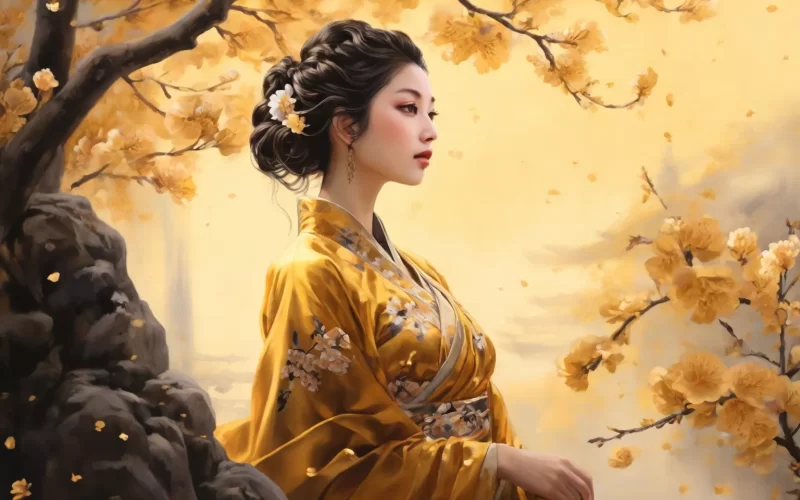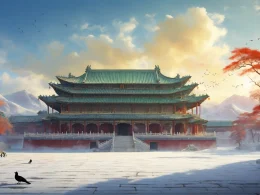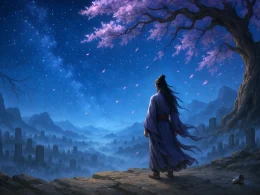Covet not a gold-threaded robe,
Cherish only your young days!
If a bud open, gather it --
Lest you but wait for an empty bough.
Original Poem
「金缕衣」
杜秋娘
劝君莫惜金缕衣,劝君惜取少年时。
花开堪折直须折,莫待无花空折枝。
Interpretation
Composed during the mid-Tang Dynasty by the renowned courtesan Du Qiuniang, this poem carries a didactic message wrapped in tender yet emotionally charged language. With its vibrant rhythm, luminous diction, and profound allegory, it has been widely circulated both as literary masterpiece and life admonition through the centuries.
First Couplet: « 劝君莫惜金缕衣,劝君惜取少年时。 »
Quàn jūn mò xī jīn lǚ yī, quàn jūn xī qǔ shàonián shí.
Don't cling to robes with golden thread, my dear; But cherish all your youth's bright hours instead.
The opening "I urge you" establishes an intimate tone—part parental guidance, part lover's plea. The "gold-threaded robe" symbolizes material wealth and status, deliberately devalued against the priceless commodity of youth. The parallel structure and imperative verbs create urgent moral symmetry, framing time as life's ultimate currency.
Second Couplet: « 花开堪折直须折,莫待无花空折枝。 »
Huā kāi kān zhé zhí xū zhé, mò dài wú huā kōng zhé zhī.
When blooms beg picking, pluck them bold— Don't snap bare twigs when flowers fold!
Here, floral imagery concretizes temporal philosophy. The insistent cadence ("must pluck now") conveys time's irreversible flow, while the warning against "bare twigs" personifies regret. The couplet's chiasmic structure—"must…don't" mirroring "don't…must"—amplifies both musicality and psychological urgency.
Holistic Appreciation
"The Golden Threaded Robe" constructs profound emotional tension and philosophical depth within just four lines, standing as an exemplary work among ancient didactic and carpe diem poems. The first couplet emphasizes "cherishing time" while the latter advocates "seizing the moment," blending abstract concepts with concrete emotions. The female poet Du Qiuniang employs characteristically delicate feminine brushstrokes to merge aesthetic sensibility with philosophical contemplation, transforming abstract life insights into tangible imagery that resonates powerfully. Deceptively simple on the surface, the verses contain multivalent interpretive possibilities—readable both as encouragement to cherish youth and pursue love, and as motivation for striving and achieving merit.
The poem demonstrates remarkable artistic craftsmanship: symmetrical diction, lively rhythm, and melodic tonal variations create exceptional singability. Particularly effective is the strategic repetition of key phrases like "I urge you," "cherish," and "pluck," which not only intensify the exhortatory tone but also produce a lingering sonorous quality when recited, generating profound emotional reverberation.
Artistic Merits
- Tight structure with thematic focus: Each of the four lines interconnects seamlessly, developing the "value time" theme through progressive layers without superfluous words.
- Precise language with symmetrical form: The parallel couplets employ repetition with subtle variation, avoiding monotony while enhancing rhythmic vitality.
- Philosophy embodied in imagery: The "golden threaded robe" symbolizes wealth and status while "flowers" represent fleeting time, materializing abstract concepts with vivid, affecting power.
- Authentic emotion with urgent persuasion: The whispering tone blends philosophical wisdom with worldly insight, conveying natural yet resolute emotion through gentle firmness.
Insights
This poem's greatest illumination lies in its acute awareness of life's brevity and youth's transience. It exhorts us to treasure our prime, act decisively in the present, neither dazzled by superficial glamour nor paralyzed by hesitation. The imperative to "pluck flowers when they beg for plucking" applies equally to courageous romantic pursuit and all life's actionable opportunities. For contemporary readers, whether in study, career, relationships or daily living, the poem reminds us: youth has limits—don't squander time. Only timely action prevents future regret. Ultimately, the work transcends its historical context to offer timeless guidance about purposeful living amid temporal constraints.
Poem translator:
Kiang Kanghu
Du Qiu, 791-? Du Qiu, known as Du Qiu Niang (杜秋娘), was a native of Jinling in the Tang Dynasty, and became the concubine of Li Qi (李锜) when she was 15 years old. At the age of 15, she became a concubine of Li Qi. In 807 AD, Li Qi formally rebelled against the Tang Emperor Xianzong, who favored her and brought her into the palace. She was later favored by Emperor Xianzong of the Tang Dynasty, and later returned to her hometown.












